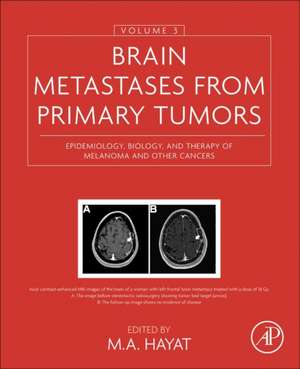Brain Metastases from Primary Tumors, Volume 3: Epidemiology, Biology, and Therapy of Melanoma and Other Cancers
Editat de M. A. Hayaten Limba Engleză Hardback – 27 apr 2016
Melanoma is the third most common diagnosis among patients with brain metastases, after lung and breast cancer. Approximately 75% of patients with metastatic melanoma develop brain metastases during the course of their disease. Although tumorigenesis of melanoma remains poorly understood, recent advances in gene expression profiling have revealed molecular mechanisms of this deadly disease. In addition, high-throughput gene expression has many advantages over techniques in cancer transcriptomic studies and has led to the discovery of numerous diagnostic, prognostic, and therapeutic targets, which are also detailed in this book.
The book discusses the link between primary tumors and brain metastasis of melanoma, including molecular mechanisms, treatment options, prognosis, and general applications. Comprehensive chapters discuss systemic therapy, integrin inhibitors, stereotaxic radiosurgery, and more, making this book a great resource for neurooncologists, neurosurgeons, neurologists, and cancer researchers.
- Presents the only comprehensive reference detailing the link between primary cancers and brain metastases in melanoma
- Aids the target audience in discussing various treatment options for patients with brain metastases from melanoma
- Edited work with chapters authored by leaders in the field around the globe – the broadest, most expert coverage available
Preț: 642.89 lei
Preț vechi: 855.94 lei
-25% Nou
Puncte Express: 964
Preț estimativ în valută:
123.01€ • 128.90$ • 101.70£
123.01€ • 128.90$ • 101.70£
Carte tipărită la comandă
Livrare economică 04-18 aprilie
Preluare comenzi: 021 569.72.76
Specificații
ISBN-13: 9780128035085
ISBN-10: 0128035080
Pagini: 384
Dimensiuni: 191 x 235 x 23 mm
Greutate: 0.91 kg
Editura: ELSEVIER SCIENCE
ISBN-10: 0128035080
Pagini: 384
Dimensiuni: 191 x 235 x 23 mm
Greutate: 0.91 kg
Editura: ELSEVIER SCIENCE
Public țintă
Advanced graduate students, researchers, and clinicians in the fields of neurooncology, neurosurgery, cancer research, pathology, and neurologyCuprins
I. Molecular Mechanisms
1. Introduction
2. The Management and Biology of Metastatic Cancers to the Brain
3. Melanoma Metastases Are Underrepresented in Cerebellum Compared with Metastases from Colorectal Cancers
4. Risk Reductions of Recurrence and Mortality in Melanoma Patients Using IFN-α
5. Brain Metastases from Melanoma
6. Pathobiology of Brain Metastases: Molecular Mechanisms
7. Role of CDKN2A Mutations and Other Relevant Genes in Melanoma Predisposition
8. The Role of the Receptor for Advanced Glycation End Products in Malignant Melanoma
9. Hydrogen Sulfide Pathway and Cancer
10. Brain Metastasis from Esophageal Cancer
II. Treatment and Prognosis
11. Treatment of Metastatic Melanoma Patients Bearing C-Kit Mutation Using Imatinib Mesylate
12. Optimal Selection of Targeted Therapies for Melanoma Patients: Role of Mitogen-Activated Protein Kinase Pathway
13. Patients with Brain Metastases from Melanoma: Treatment with Surgery and Radiotherapy
14. The Risks and Advantages of Whole Brain Radiation Therapy in Patients with Brain Metastases
15. Gastrointenstinal Stromal Tumors with Intracranial Metastasis: Treatment Strategy and Review of the Literature
16. Brain Metastases from Breast Cancer in Patients Receiving Trastuzumab
17. Brain Metastases from Cutaneous Melanoma: Biology and Its Implications for More Rational Therapeutic Approaches
18. Treatment of Brain Metastases from Ovarian and Endometrial Carcinomas Using Stereotactic Radiosurgery
19. Prognostic Factors for Survival in Melanoma Patients with Brain Metastases
20. Management of Melanoma Therapy-Associated Toxicities
21. Brain Metastases from Breast Cancer: Focus on Risk Factors, Treatment and Clinical Outcome
1. Introduction
2. The Management and Biology of Metastatic Cancers to the Brain
3. Melanoma Metastases Are Underrepresented in Cerebellum Compared with Metastases from Colorectal Cancers
4. Risk Reductions of Recurrence and Mortality in Melanoma Patients Using IFN-α
5. Brain Metastases from Melanoma
6. Pathobiology of Brain Metastases: Molecular Mechanisms
7. Role of CDKN2A Mutations and Other Relevant Genes in Melanoma Predisposition
8. The Role of the Receptor for Advanced Glycation End Products in Malignant Melanoma
9. Hydrogen Sulfide Pathway and Cancer
10. Brain Metastasis from Esophageal Cancer
II. Treatment and Prognosis
11. Treatment of Metastatic Melanoma Patients Bearing C-Kit Mutation Using Imatinib Mesylate
12. Optimal Selection of Targeted Therapies for Melanoma Patients: Role of Mitogen-Activated Protein Kinase Pathway
13. Patients with Brain Metastases from Melanoma: Treatment with Surgery and Radiotherapy
14. The Risks and Advantages of Whole Brain Radiation Therapy in Patients with Brain Metastases
15. Gastrointenstinal Stromal Tumors with Intracranial Metastasis: Treatment Strategy and Review of the Literature
16. Brain Metastases from Breast Cancer in Patients Receiving Trastuzumab
17. Brain Metastases from Cutaneous Melanoma: Biology and Its Implications for More Rational Therapeutic Approaches
18. Treatment of Brain Metastases from Ovarian and Endometrial Carcinomas Using Stereotactic Radiosurgery
19. Prognostic Factors for Survival in Melanoma Patients with Brain Metastases
20. Management of Melanoma Therapy-Associated Toxicities
21. Brain Metastases from Breast Cancer: Focus on Risk Factors, Treatment and Clinical Outcome


















